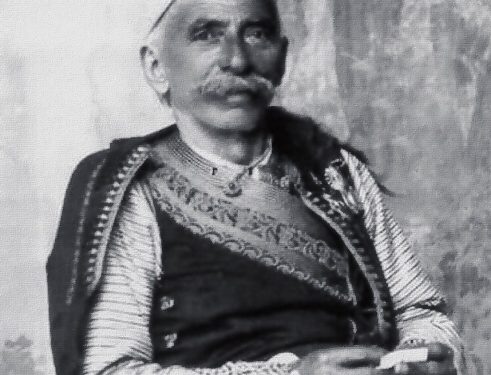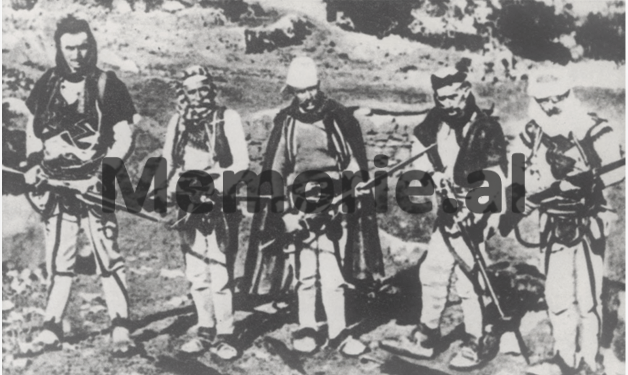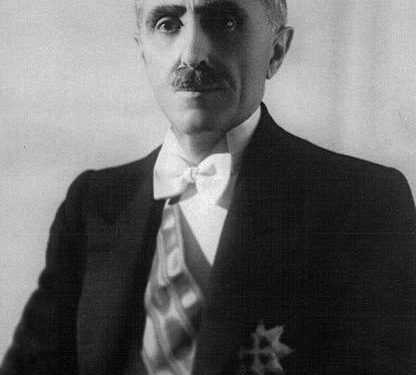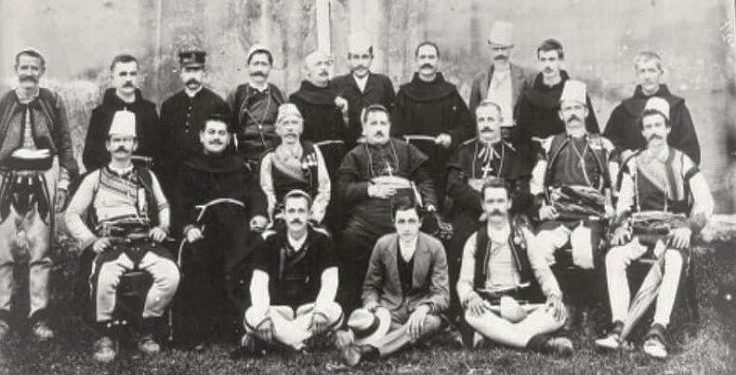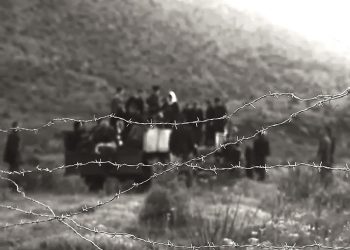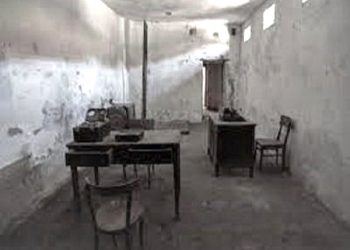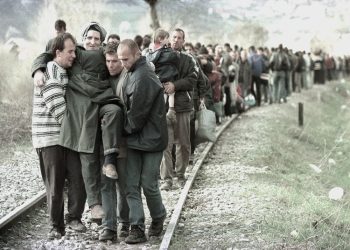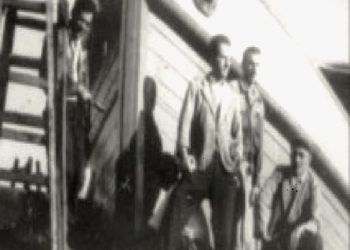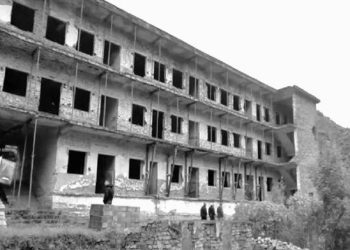By Tom Mrijaj, New York
The first part
Memorie.al / Like many outstanding patriots, who were covered by the dust of oblivion, the same fate followed the man and the unforgettable patriot, Captain Gjon Destanisha. He was executed in a barbaric manner by the security forces of UDB – of Yugoslavia, in the yard of Pristina Prison. From that day until today, it is not known where the remains of the martyr of Albanianism and anti-communism in Albania and Kosovo rest. The remains in his grave speak of consecutive murders that happened that day, when Serbian machine gun bullets took the life of the Zogist nationalist, career soldier, Captain Gjon Destanishte (1900-1951).
In Kosovo and Albania, unfortunately, the silence that remains a killer of modern times, made me collect the scattered pieces of the life and nationalist work of the Shkodran patriot, Captain Gjon Destanisha, through oral traditions, historical sources from many decades ago, any witnesses or manuscripts that I could find during my frequent trips to my hometown and Shkodër.
I don’t pretend to shed much light on this deliberately forgotten personality. Maybe this is the second “candle”, after that of his children, that I am trying to light, for his pure soul, without being able to put it on the independent martyr…!
The warm patriotic hearth, where the nationalist was born and grew up
Captain Gjon Destanisha was born on March 13, 1900, in Shala i Dukagjin, in the Gimaj district. This region, historically, has been an important center of the war against the Turkish invaders, over the centuries. Foreign travelers, clerical missionaries, local and foreign scholars, albanologists and researchers of our days have written many times about the Gimaj of Shala e Dukagjini, highlighting the bloody history, among frequent wars and battles, that the brave men of the area have developed, against the intentions of the chauvinists, the fignja of the invading armies.
They were brave, who joined the occasional early uprisings of the highlanders, for freedom, the flag and the religion of the ancestors. Among them, there are fighters who participated in the war with weapons in hand, in support of the uprising of the brave man of freedom and the flag, Dede Gjon Lulit, on April 6, 1911, which has remained engraved in the annals of history, as the famous battle in “Istikamin of Decicic”.
This province has been very well known for the high values of Albanian traditions, which were preserved and passed down from generation to generation, through the odes and assemblies of men, where the songs of the brave for freedom were sung and progressive thoughts were prepared for the future. of the Highlands as a whole.
In these ancient Albanian stone towers full of turrets, little John rocked in his cradle. His father, Lulash Nresi, had seven children, of whom, five boys and two girls. Little John was the third child. Their economic life was simple. They lived with agriculture and cattle breeding, characteristic of most of the Highlands.
At a young age, his parents die and the whole family with many small children remains under the care of his older brother, Pjetër Lulash, who is later heroically killed in the war against the Serbo-Montenegrin chauvinist troops. Pjetri joined the patriotic ideals, which were met with a hail of flames by the first of Shala’s sons, the well-known brave, Mehmet Shpendi.
At that time, it was difficult for the young Peter to take the reins of the big family. But thanks to the care that his parents had shown, always keeping him close and representing them in many meetings, joys and sorrows, he had already become a man before his time and with a chest, he faced this family and noble duty, which God and his family assigned him , until the last days, when he gave his life for the freedom of Albania.
Pjeter Lulashi, today is mentioned in his country with great respect, because he preserved with honor and dignity the good name enjoyed by his family, in the wars against the Turks and Serbo-Montenegrin chauvinists, coloring with his blood the patriotism for the expensive lands Albanian. Above all, he stands out as a warrior with typical Albanian virtues, such as; courage, determination, to see the war to the end, generosity, generosity for the friend and the person in need, a rifle always raised for the enemy, few words and wise in the assemblies of men. The martyr of freedom, in the odes of the men of the highlands, spoke correctly and effectively at the right time and place.
The death of Peter’s older brother was another unexpected loss for the Destanisha family, whom God had put to the test to face other dangers and difficulties in life. Having difficult economic conditions in their homeland and for a more secure economic life, the Destanisha family, with their fragile children, orphaned sisters and brothers, take the road to the ancient city of Shkodra, taking with them from their birthplace, very few belongings double rifles are also needed. Their relatives in the city of Shkodra, become the warm shelter of fragile children and young people, helping you as much as they could.
Young John, from the first days of schooling, catches the eye of his teachers, for the intelligence that he had thanks to God and nature. At the Catholic primary school in Shkodër, Gjoni was making progress in his studies. For this reason, he was well liked by his superiors and well-known clerical teachers, who make every effort to ensure that his schooling years with them are not interrupted. They had seen in this child, the typical mountaineer, with the quality of pride, intelligence, gentleness and Christian love for peers, etc.
Gjoni, after finishing school near the Franciscan Monastery in the city, with very high results, enrolled in a school, which was opened by the Germans at the time and was called “Lower School”. Here, he had the good opportunity to receive modern western knowledge, to learn foreign languages, in addition to those he had learned in private Catholic schools in Shkodër. German was a language that attracted him a lot and he stood out at the top of the class, for the best results in learning German, along with other subjects, that were developed in that school.
Upon the arrival of the Austro-Hungarian troops in the North of Albania, Gjoni would find work as a German translator, having the opportunity with the good salary he received, to fix the poor economic life of his family, with many siblings. Back to school. This time, the young Destanisha, with an ever-consolidated culture, would give life to the realization of his dream, to be a soldier in the service of his people who always loved and respected him.
So he would attend a 2-year military course in Vienna, Austria. After completing his studies, he returns to Albania. As a soldier from the governments of the time, he was assigned to many provinces and cities of Albania, preserving his military career with honor and glory. He served as a commander in the Gendarmerie, in the North and South of Albania. For a while we see him, according to historical sources, commander in Saint Paul of Mirdita.
Captain John, a friend of the Door of Captains of Mirdita
This is how the Captain of Mirdita, the great nationalist Ndue Gjon Marku, over 90 years old, living in New York, describes him: “Captain Gjon Destanisha, was the assistant commander of the Gendarmerie, in Sh’Pal of Mirdita (in the sub-prefecture of Mirdita at the time, my note T.M. ).
He was a sympathizer of Gjon Marka Gjon, so much so that he was in daily contact with Kapidan Gjon, he went out with his family to Mali e Shejt. They had long conversations with each other. Captain Gjon Destanisha had gambling with Preng Gjergj Keçin in Krë (Lura e Poshtme, my T.M. note) and his burning desire was to go to Krë, to the gambling house.
This desire, Gjon Marka confesses to Gjon, who knew better the situation of those days, therefore he was careful not to cause me any trouble with the regime of the time. He was wise, measured in his judgment and subtle in his interpretation of the rather delicate situation of the regime.
He tried to stay as far as possible from any compromise that could bring him any political trouble. Captain Gjoni, I instruct Captain Gjon Destanishte not to go to Lura, because the Government thinks that I have brought you anti-government propaganda against the Monarchy, because our relations with the King at that time were known.
But after many insistences of Gjon Destanisha, I gave his consent, and so the next day, together with my brother (Dr. Mark Gjomarku and I, Ndue Gjon Marku, my note T.M.), his brother, Mark Destanisha and with to arm ourselves, we left for Krë, on the back of Preng Gjergj Keçi. There I was warmly welcomed by this family with generous Albanian traditions and customs. From there we go to Brahim Gjoçi for lunch. From there, he was assigned to go to Lure t-Eperme. This was an unfortunate step for the father (Captain John Mark Gjonin, my note T.M), who foresaw the political consequences…”!
And Captain Ndue Gjon Marku remembers the continuation of the road of Captain Gjon Destanisha with his friends: “They continued the road to Lure t’Eperme, to Gjon Doçi’s spire, which was the first spire in Lure. From Gjon Doçi, to Bajraktari of Lura, Selman Mema and, from there, straight to Dalip Kaci’s cave.
From Lura s’Eperme, we returned to Krë, to Dede Kaçorri’s guest house, for dinner. The next day, while we were enjoying the first rays of the sun that had just fallen in the yard, the newsman Marka Kolë Ndreu arrived, specially sent by Gjon Marka Gjon, with an order (message) that he must leave immediately for Mount Shejt .
Gjon Destanisha cancels all the plans he had previously made and immediately returns to Captain Gjon Marka Gjoni. He tells Captain John Destanishe; “I thought that you would only stay in Krë, and not go to Lura t’Eperme, because the government, the monarch thought, that I had taken you with anti-government propaganda”, and gave the transfer telegram to South of Shqipnis, which had arrived from Tirana. Since that day, I haven’t seen Gjon Destanisha”!
The arrival of King Bird and the appreciation of the military
Now even the disobedient communist historians, have recently accepted through their Academy in Tirana, that the period of the reign of the King, Ahmet Zogut, for the period of 1928-1938, has made the assessment and approach to the ministerial portfolios, in all departments and in the local government of prominent people, who had studied in the most popular universities in Western Europe and that King Zog, has the indisputable merit in the formation of the Albanian state, after the glorious era of Gjergj Kastriot (1405 – 1467), strengthening the order, through a pro-Western orientation.
With the arrival of the monarchist government in power and after 1924, Captain Gjon Destanisha was cordially invited to a private audience by King Zog himself, offering him the position of district commander of the Albanian Gendarmerie, in many parts of the country in Albania, at different times time.
Thus, Captain Gjon Destanisha began to serve as a career soldier, with the duty of district commander in the North of the country, where he was then transferred to: Burrel, Leskovik, Korça, Tirana and elsewhere. In 1935, the so-called “Fier Uprising” took place. According to some memories written by witnesses of the time, it appears that the insurgent forces led by Et’hem Toto made a significant progress.
King Ahmet Zogu, worried by the rebel insurgents, called the Minister of the Interior, who informed him: “Your Highness, you should stay calm and not worry too much, because the government troops were attacked by an experienced soldier, very skilled in respecting order and maintaining public peace”!
It was captain Gjon Destanisha, with 50 elite gendarmes selected by the military chief himself. And so it happened. Within a very short period, the government forces led by the experienced captain Gjon Destanisha, threw into the sea about 5000 rebel forces, which brought unrest to the constitutional order.
In addition to very practical military tactics, John used a psychological strategy, carefully studying the discontent of the insurgent leaders themselves and those who began to desert, after realizing that they had entered a dead end, joined the monarchist forces and, broke the few rebels who remained. After this event, Captain Gjon Destanisha goes to the military school in Florence, Italy, around 1936-1937. After finishing his studies, he returns to his homeland. He serves again as district commander, in different prefectures of Albania.
According to my research, I was also lucky enough to know his brother, Mark, here in New York, with whom I spoke often. I had such conversations with the grandson of Captain Gjon Destanish, Lazër Palin, with whom we discussed for hours about the past years. The invasion of the country on April 7, 1939, found Captain Gjon in Tirana, on duty. He immediately joins the forces of the prominent nationalist Abaz Kup, in the resistance war. After the flight of King Zog to Greece, he leaves his duty as a soldier, returns home, where he stayed for 3 months without a job.
The government of Shefqet Verlac, appoints him to duty in Kosovo
The government of Shefqet Verlac, asked Captain Gjon to return to duty, as a military specialist with duties with many responsibilities in Kosovo, which Captain Gjon Destanisha, accepted without hesitation. Here, he was given the opportunity to realize the dream, which had tormented him for many years; the killing of the elder brother, Pjetër Lulash, with many other compatriots in Shala te Dukagjni by the barbaric Serbo-Montenegro chauvinists.
He took up the position as district commander of the Gendarmerie in Pristina, Pejë, Suhadoll, Graçanic, Lipjan, and many cities and towns in Kosovo. He was very harsh towards the Serbs and Montenegrins who lived there. He stayed in Kosovo during the entire period of the Second World War. The year 1945 found Captain Gjon Destanishten in Shkodër. As an avowed anti-communist, he had no intention of surrendering to the new communist rulers and, moreover, serving them.
He went to the rugged mountains of Dukagjin, together with his nephew, Lazër Pal and many others, where they stayed for four years in rain, snow and frost, with bread and no bread, in winter and summer, through mountains and caves, fought with rifle in hand, against the communists led by Mehmet Shehu.
The anti-communist attitude of the highlanders of Dukagjin
In the book “An underground catacomb” (Croatia, 2004, p. 136) written by Fritz Radovani from Shkodra, in the chapter: “WHAT ARE THE CAVES, WHO IS WAITING FOR ME?” DED GJO’ LULI”, it refers to the established resistance of the province of Dukagjin, in the Highlands of Mbishkodra. This is how the author describes the situation in 1945, through documents obtained from the Central State Archive in Tirana.
“Not even twenty years have passed, that once again the unforgettable scenes are being felt, when among those wild mountains like the beasts that live among them and, when, those fresh flowers of the Alps had not yet grown, where, the mind stops for a instant thought; where you see the vigaya lined up around that old woman, who didn’t know her name.
They are the people of Dukagjini, lined up next to those brooks, streams, stones and the river that descends rapidly, its luxuriance has taken with it more people than shingle, cobbles and pine logs, to feed the streams of Velipoja, insatiable with the blood of Kosovar Albanians, for along those shores, in Ulcin up to Tivar. Yes, they are the sons of Loke, whose soles were first wet, they stepped on the cashews, cut into hawthorns and pine cones, and split them between the blades of stones, under which the stream still gurgles in flow through the drawings of the Albanian’s forehead: THE BLOOD OF THE GEG. Memorie.al
The next issue follows





